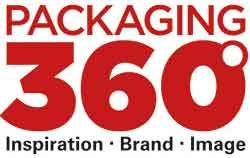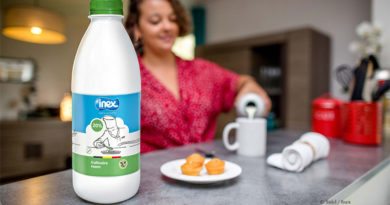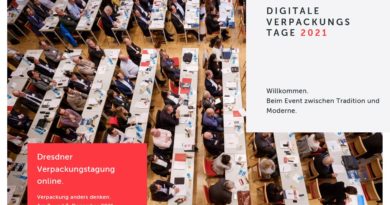Machines „Made in Germany“ Remain in Demand
Packaging machines „made in Germany“ are in demand. This is among other reasons due to the fact that mechanical engineering is making an important contribution to sustainability with new technologies. Three questions to Vera Fritsche, Packaging Machinery, International Trade Fairs and Markets and Business Cycle Officer at the German association of the mechanical and plant engineering industry (VDMA), on current developments and challenges.
What are currently the decisive trends for manufacturers of packaging machinery?
Vera Fritsche: The packaging market continues to grow worldwide. There are two main reasons for this: Increasing urbanization and the continuing trend towards more convenience products. A rising global demand for packaged food, the demand for more and more convenience, and growing requirements on the part of consumers and legislators: all this is also reflected in increasing investments in German packaging technology. Because packaging machines „made in Germany“ are in demand worldwide.
Global investment in German-made packaging machinery continues unabated. In the first seven months of the current year, manufacturers of packaging machinery excluding beverage filling machines took almost 22 percent more orders on their books than in the same period of the previous year. However, it should be noted that the high growth rate is partly due to special effects, as the comparative figure for the previous year was down 10 percent due to Corona. Demand came from both Germany and abroad. For example, domestic orders increased by almost 27 percent in the period from January to July 2021, while orders from abroad rose by 21 percent.
Packaging machinery manufacturers generate more than 80 percent of their sales abroad. In the first seven months, exports reached a value of 3.2 billion euros, an increase of 2.5 percent compared to the same period last year. Europe remains the most important sales region. Shipments to the 27 EU countries rose by 3.2 percent to 1 billion euros and to the rest of Europe by almost 6 percent to 434 million euros. North America followed in second place, with machinery deliveries increasing by almost 28 percent to 656 million euros. The USA was again the driving force, with growth of 23 percent to 573 million euros. Exports to Asia fell by 13 percent to 209 million euros, to Latin America by 14 percent to 192 million euros and to Africa by 17 percent to 147 million euros. Exports to the Near and Middle East reached 131 million euros, an increase of almost 15 percent compared to the same period last year.
What challenges do machine manufacturers have to face, especially with regard to sustainability?
Fritsche: On the one hand, packaging is the key to ensuring that food reaches the consumer safely and hygienically. On the other hand, packaging, especially plastic packaging, is under discussion worldwide and especially in Europe. Sustainable packaging solutions are in demand. Sustainability is one of the key issues of our time – not only in packaging materials, but also in packaging technology.
Less packaging material is a requirement for sustainable packaging. For example, highly efficient film advancement systems reduce film waste in the form of edge strips and die-cut grids. This allows more packaging to be produced from one film web. New, sustainable packaging materials differ in many ways from previously used materials in terms of processability and machinability. For example, the sealing behavior of today’s plastic packaging made of monofilm or paper packaging differs from the materials used in the past. Due to the sensitive nature of the material, sealing technologies must therefore be particularly gentle.
The implementation of sustainable packaging concepts often requires the conversion and adaptation of machines. The mechanical engineering sector offers solutions for converting existing machines and systems on the market so that paper-based packaging materials can also be processed without restrictions in terms of speed or format.
How else do machine manufacturers help with sustainability?
Fritsche: Sustainability and resource efficiency have been important topics for the packaging machinery industry for many years. With their technology, they offer numerous solutions that help to efficiently use or save energy, water and raw materials. This also includes the use of energy-efficient components in the machines. Hygienically designed machines that are easy to clean help to reduce food losses on the one hand, and on the other hand, less water is needed to clean the machines. The use of highly efficient cleaning technologies further lowers water consumption and reduces the use of cleaning agents and energy. Among other things, this positively influences the energy balance of the manufacturing industry and reduces production costs. The optimal use of energy, water and raw materials is therefore also a central starting point for increasing efficiency in production and reducing costs.




